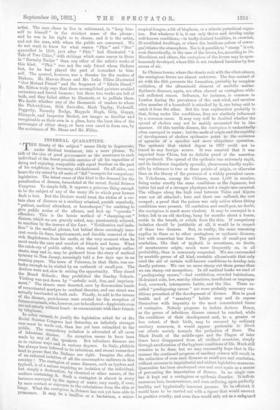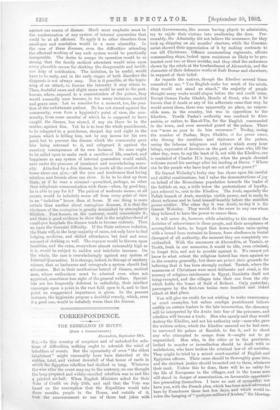INTERNAL QUARANTINE. " T HE liberty of the subject" seems likely
to degenerate, under Medical treatment, into a more phrase. To talk of the aim of good government as the assurance to each individual of the freest possible exercise of all his capacities of doing and enjoying, compatible with equal freedom on the part of his neighbour, is becoming old-fashioned. On all sides, one hears the cry raised by all sorts of "fad"-mongers for compulsory legislation. The latest craze of this kind is the demand for the penalisation of disease, formulated at the recent Social Science Congress. To simple folk, it appears a grievous thing enough to be the subject of any of the many ills to which poor human flesh is heir. But the Doctors would treat the victim of a cer- tain class of diseases as a sanitary criminal, punish somebody, "patient, medical attendant, or housekeeper," for omitting to give public notice of the offence, and lock up " zymotic " offenders. This is the heroics method of " stamping-out " disease, which we are gravely asked, nay, passionately adjured, to sanction by the terrors of the Law. "Notification and isola- tion" is the medical phrase, but behind these seemingly inno- cent words lie fines, imprisonment, and forcible removal of the sick Englishman from his castle, at the very moment when he most needs the care and comfort of friends and home. What the catch-cry of public safety, when raised by sanitary enthu- siasts, may end in, may be gathered from the story of medical tyranny in New Jersey, amusingly told a few days ago in an evening Paper. The town of Paterson, in that State, was un- lucky enough to be visited by an outbreak of small-pox. The doctors were not slow in seizing the opportunity. They closed the Board Schools ; they prohibited the Sunday Schools. Visiting was put down by "carbolic acid, fine, and imprison- ment," The streets were deserted, save by disconsolate bands of revae,cinated martyrs to medical theories, and one street was actually barricaded at both ends. Finally, to add to the terrors of the disease, pest-houses were erected for the reception of future criminals, who, however, are to be allowed—hygienists even are not utterly without heart—to communicate with their friends by telephone. In sober earnest, to justify the legislation asked for at the Social Science Congress last Saturday, an infinitely stronger case must be made out, than has yet been submitted to the public. The compulsory isolation is advocated of all cases of infectious disease. No exception seems to have been made by any of the speakers. But infeotious diseases are so in various ways and in various degrees. In Italy, phthisis has always been believed to be infectious, and recent researches tend to prove that the Italiansa re right. Imagine the effect of an enforced isolation of the consumptive sufferers in this country ! The contagion of some diseases, such as typhus and typhoid, is of a nature requiring but simply a destruction, by no isolation of the individual, chemical or other means, of the matters containiog it. Such a contagion is almost in every instance conveyed by the agency of water, very rarely, if ever, by mere contact or exposure to the exhalations from the skin or lungs. What the contagiunn is, Science has not yet been able to pronounce. It may be a bacillus or a bacterium, a micro- scopical fungus, a bit of bioplasm, or a minute parasitical organ- ism. But whatever it is, it can only thrive and develop under well-known conditions,—in badly-drained localities, in crowded, ill-ventilated dwellings, or where the insidious poison of sewer- gas:vitiates the atmosphere. Nor is it possible to "stamp " it out, even theoretically, in the case of the fevers, for, according to Dr. Murchison and others, the contagiam of the fevers may be spon- taneously developed, where filth is not rendered harmless by free• access of air.
' In Chinese towns, where the streets reek with the vilest odours, the contagious fevers are almost unknown. The free contact of air with the filth prevents the formation, probably by complete oxidation, of the albuminoicl element of morbific matter. Epidemic diseases, again, are often classed as contagious with- out sufficient reason. Influenza, for instance, is common in London during the prevalence of the east wind, and member after member of a household is attacked by it, one being said to catch it from the other. But the true explanation probably is that, living under like conditions, they are similarly influenced by a common cause. It may very well be doubted whether the spread of cholera may not be mainly accounted for in like manner. Of this terrible disease, the contag inn?, is undoubtedly often conveyed in water; but the mode of origin and the rapidity of development of cholera epidemics point to the existence of 'agencies of a speedier and more ubiquitous operation. The epidemic that visited Japan in 1877 could not be traced to any foreign source. It was asserted that it was imported from China, but no definite proof of the assertion was produced. The spread of the epidemic was extremely rapid, and. its incidence singularly sporadic, phenomena hardly explic- able by reference to two or three points of origin, or otherwise than on the theory of the presence of a widely prevalent cause. In Yokohama, among the Chinese, some 1,500 in number, living under exactly the same conditions as the Japanese, but better fed and of a stronger physique, not a single case occurred. The villages along the high road between Tokio and Kiyoto were not all attacked ; here and there one suffered, the rest escaped; a proof that the poison was only active where fitting conditions were present. Of scarlatina and small-pox, no doubt, the contagium is much more virulent. It may be conveyed in a letter, left in an old stocking, hang for months about a house, reside in the breath, or exhale from the skin. If compulsory isolation should be justifiable at all, it would be in respect of these two diseases. But, in reality, the same reasoning applies to these as to other contagious or epidemic diseases, but with somewhat less force. The poison of small-pox and scarlatina, like that of typhoid, is sometimes, no doubt, of spontaneous origin, much more frequently so, in all probability, than is commonly suspected. We are surrounded by morbific germs of all kind, unstable albuminoicls that only need the aid of certain well-known conditions to develop into deadly poisons. We can no more stamp out these germs than we can stamp out mosquitoes. In all medical books we read of "predisposing causes,"—bad ventilation, crowded habitations, ill.drained soils, low, marshy situations, insufficient or improper food, overwork, intemperate habits, and the like, These so- called. "predisposing causes" are more probably necessary con- ditions precedent of the development of disease. Men in good health and of " sanatory " habits may and do expose themselves with impunity to the most concentrated forms of contagion. Nobody proposes to isolate doctors. Hence, as the germs of infectious disease cannot be reached, while the conditions of their development and, to a greater or less extent, of their birth, may be removed by ordinary sanitary measures, it would appear preferable to direct our efforts mainly towards the perfection of these. The Black Death of the middle-ages and the Plague of later times have disappeared from all civilised countries, simply through amelioration of the hygienic conditions of life. Much still remains to be done, but we may reasonably hope that in like manner the continued progress of sanitary science will result in the extinction of even such diseases as small-pox and scarlatina, without recourse to inquisitorial and violent legislative measures. Quarantine has been condemned over and over again as a means of preventing the importation of disease. In no single case has it kept out a contagious or epidemic disorder. It inflicts enormous loss, inconvenience, and even suffering, upon perfectly healthy and hygienically innocent persons. To be efficient, it would have to be carried out with a rigour that would amount to positive cruelty, and even then would only net as a safeguard against one source of disease. Much more emphatic must be the condemnation of any system of internal quarantine that could be at all efficient. To apply it to other disorders than small-pox and scarlatina would be a mere absurdity. In the case of these diseases, even the difficulties attending the effectual working of any such system would be practically insuperable. The desire to escape its operation would be so strong, that the family medical attendant would seize upon every plausible excuse for shirking the disagreeable and invidi- ous duty of notification. The isolation, to be useful, would have to be early, and in the early stages of both disorders the diagnosis is not always easy. Nor is it possible, at the begin- niug of an attack, to foresee the intensity it may attain to. Thus, doubtful cases and slight cases would be sent to the pest. houses, where, exposed to a concentration of the poison, they would assuredly soon become, in too many instances, marked and grave ones. Let us consider for a moment, too, the posi- tion of the unfortunate patient. He has not sinned against the community, even from a hygienist's point of view, the com- munity, from some member of which he is supposed to have caught the disease, has sinned, if any sin there be in the matter, against him. Yet he is to bear the whole punishment, to be relegated to a pest-house, steeped day and night in the poison which is killing him, not by any means for his own good, but to prevent the disease which the community gave him being returned to it, and safeguard it against the sanatory consequences of its own laziness. No man ought to be called upon to make such a sacrifice of life, comfort, and happiness as any system of internal quarantine would entail, save under the pressure of imminent and overwhelming neces- sity. Attacked by a dire disease, he needs all the comfort that home alone can give,—all the care and tenderness that loving relatives and friends alone can show. Is he to be shut up from them, as if he were a criminal—permitted, perhaps, no other than telephonic communication with them—when, by good-hap, he is able to pay for it ? The patient of moderate means, at all events, would be infinitely worse off from every point of view in an "isolation" house than at home. If one thing is more certain than another about contagious diseases, it is that the virulence of the contagium is greatly diminished by atmospheric dilution. Pest-houses, on the contrary, would concentrate it; and there is good evidence to show that in the neighbourhood of small-pox hospitals the disease tends to become endemic. Then we have the financial difficulty. If the State enforces isolation, the State will, in the large majority of cases, not only have to find lodging, medicine, and skilled attendance, but food and some amount of clothing as well. The expense would be thrown upon localities, and the rates, everywhere almost unbearably high as it is, would be subject to sudden and indefinite increase. On the whole, the case is overwhelmingly against any system of Internal Quarantine. It is strange, indeed, in this age of sanitary science, that so barbarous and retrograde a system should find advocates. But in their meritorious hatred of disease, medical men, whose enthusiasm must be admired even when not approved, sometimes lose sight of the general welfare. Special- ists are too frequently deficient in catholicity, their intellect converges upon a point in the vast field open to it, and to that point an exaggerated importance is given. In the present instance, the hygienists propose a doubtful remedy, which, even if a good one, would be infinitely worse than the disease.



































 Previous page
Previous page